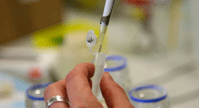Imerslund-Grasbeck Syndrome (IGS) or Selective Cobalamin Malabsorption
Description:

Canine Imerslund-Grasbeck Syndrome (IGS), or cobalamin malabsorption, is a disorder which causes a dog to be unable to absorb adequate levels of Vitamin B12. Cobalamin, or vitamin B12, is normally taken in through the small intestines. Dogs with IGS cannot absorb the vitamin and quickly begin to show symptoms of deficiency. IGS is known to affect Beagles, Border Collies, and Australian Shepherds.
IGS in Beagles and Border Collies is caused by a mutation in the CUBN gene, while Australian Shepherd-type IGS is caused by a mutation in the AMS gene. The frequency of IGS occurrence in Australian Shepherds is unknown. IGS in Beagles is more severe than in Border Collies, and presents similarities to Australian Shepherd-type IGS.
Symptoms of IGS typically appear within 6-12 weeks after birth. A puppy is born with a certain amount of Vitamin B12, but after the stored vitamin is depleted, the puppy will exhibit signs of deficiency. Symptoms include anemia, lethargy, failure to thrive, failure to gain weight, malaise, and lack of appetite. Symptoms seemingly worsen after eating. IGS can be managed with regular B12 or cobalamin supplements.
IGS is an autosomal recessive disorder. This means that a dog must inherit two copies of the mutation in order to present symptoms of IGS. A dog with one copy of the mutation is known as a carrier and has a lesser chance of presenting symptoms. If two carriers are bred to one another, there is a 25% chance per puppy born that they will develop symptoms of IGS and a 50% chance per puppy born that they will also be carriers of IGS. Although IGS can be managed with regular B12 or cobalamin supplementation, the best way to manage IGS is through prevention. Genetic testing can reveal the likelihood of a dog developing IGS and can inform a breeder of major health concerns.
Acceptable Sample Types:
Animal Genetics accepts buccal swab, blood, and dewclaw samples for testing. Complimentary sample collection kits are available and can be ordered at test now.
This Test Is Relevant For the Following Breeds:
- Beagles
- Border Collies
Results:
Animal Genetics offers DNA testing for Imerslund-Grasbeck Syndrome (IGS). The genetic test verifies the presence of the recessive IGS gene mutation and presents results as one of the following:
| IGS/IGS | Affected | The dog carries two copies of the mutant gene and is homozygous for IGS. This dog will be affected and will always pass a copy of the mutated gene to its offspring. |
| n/IGS | Carrier | Both the normal and mutant copies of the gene detected. Dog is a carrier for the IGS mutation and can pass on a copy of the defective gene to its offspring 50% of the time. |
| n/n | Clear | Dog tested negative for the gene mutation that causes IGS and will not pass on the defective gene to its offspring. |
Submit a Sample for Testing:
To submit a sample for testing please go to test now.
To order a sample collection kit please go to order sample collection kits.
Cost per sample is $45.00. Please see our fee schedules below for combination rates.










